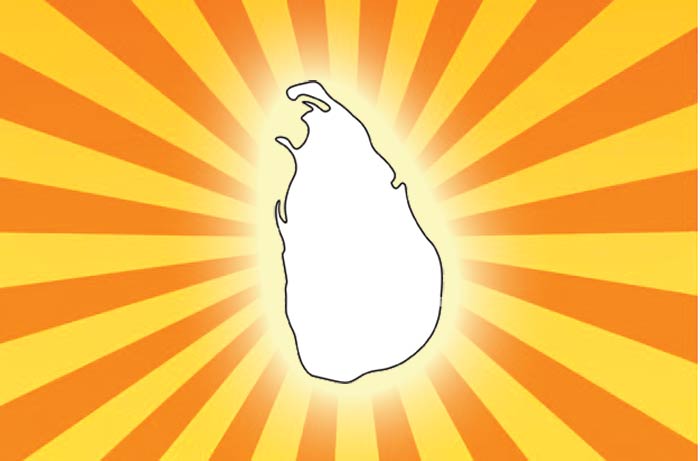By Dr Matara Gunapala During the reign of King Parakramabahu (1153-1186), Sri Lanka earned the distinguished title of the ‘granary of the Orient,’ reflecting its unparalleled agricultural abundance. The island’s breathtaking landscapes, fertile soil, and bountiful resources—including precious stones, renowned tea, rubber, and coconut—alongside its strategic deep harbours, made it a crucial hub in maritime trade. These resources drew foreign powers’ attention, and Sri Lanka experienced successive periods of colonial dominance under the Portuguese, Dutch, and eventually the British from 1815 to 1948.
British rule shifted Sri Lanka’s focus to export-oriented plantations and infrastructure primarily to benefit colonial interests. By independence in 1948, the Sri Lankan rupee was valued at approximately Rs 3.33 to the US dollar.

However, economic mismanagement in the 75 years, following independence, has led to unprecedented economic crises and currency depreciation. As of February 2024, the rupee has plummeted to around Rs 310 against the US dollar, with only a slight improvement to Rs 300 by August 2024, plunging Sri Lanka into the ranks of the world’s 22 most heavily indebted nations. Since Sri Lanka adopted an executive presidency, a cascade of constitutional amendments has fostered an environment where corruption and misconduct flourish, compromising democratic governance, destabilising the economy, and undermining the rule of law.
The urgency of the situation cannot be overstated. Politicians wielding excessive power have exploited their positions, undermining institutions like the Central Bank and judiciary, eroding accountability, and distorting justice, leading to degraded public services and denying equitable access to opportunities, a distant dream for ordinary citizens. While those in power and their associates revel in luxury and foreign travel, many Sri Lankans grapple with soaring prices and shortages of basic necessities.
Therefore, Sri Lanka must embark on a transformative journey without delay to restore its economic health and political integrity, paving the way for a prosperous future. Constitutional Reform The Constitution is the bedrock of a nation’s governance, shaping the balance of power and safeguarding citizens’ rights. In Sri Lanka, however, the Constitution has been amended over 20 times, often in ways that have concentrated power in the hands of politicians, eroded judicial independence, and compromised economic stability and public service effectiveness.
These changes have frequently undermined ethno-religious unity and hindered equal opportunities for all citizens. Recent attempts to further amend it to delay presidential elections have only deepened concerns about the current Constitution and the need for its drastic reform. A few have advocated for significant changes for constitutional reform.
Former President Chandrika Kumaratunga, presidential candidate Nagahananda Kodituwakku, and the Collective for Democracy and Rule of Law (CDRL)—a coalition of senior academics, professionals, and activists—have proposed new constitutional reform. The National Peoples Power (NPP) party has highlighted the urgent need for constitutional reform in its policy statements. For Sri Lanka to embark on a path to prosperity, a transformative new Constitution must: a) discard the presidential system of governance and curtail politicians’ ability to influence the public sector, limiting their responsibility for policymaking; b) strengthen checks and balances to combat mismanagement and enhance transparency, ensuring accountability with strict penalties for misleading the public or making false promises, c) strengthen judicial independence to uphold justice, d) fair representation to ensure equal opportunity of all ethnic groups in governance, promote unity, and give every citizen an equitable voice, e) ensure Parliament is not a burden to the country.
An excessive number of parliamentarians (225 members and the President) has long been a focal point of criticism. Their extensive powers and privileges have frequently burdened the nation. The proliferation of politicians—alongside over 455 provincial councillors and nine governors—has led to inefficiencies and corruption, with many exploiting their ability to misuse administrative and financial powers for personal gain.
Therefore, a new Constitution should: Prevent malpractices by implementing stringent measures to curb corruption and misuse of power, ensuring that public officials are held accountable for every action and expenditure. Reducing inefficiencies by streamlining the parliamentary system by reducing the number of representatives and establishing an independent body of experts to oversee political conduct, aligning governance with democratic principles and national interests. Introduction of merit-based appointments The current economic crisis and rampant corruption are symptoms of a deeper problem: many politicians lack the commitment and capability to serve the nation effectively.
The mismanagement of nationalised enterprises has resulted in significant economic losses and weakened public services. For effective governance, members of Parliament and public officials must be selected, based on merit—education, capability, experience, and integrity—rather than nepotism or sectarian interests. Parliamentary members should possess qualifications comparable to a recognised university degree and demonstrate essential leadership skills, including collaboration, critical thinking, and effective communication.
Moreover, political parties must prioritise national unity and development, preventing sectarian policies and political dynasties. Leadership should be determined by merit, honesty, and education rather than family ties, race, or other divisive factors. Embracing principles of meritocracy, pragmatism, and integrity—mirroring the values that contributed to Singapore’s success—can help restore Sri Lanka’s status as the “Pearl of the Indian Ocean” and set it on a path to renewed prosperity.
Strengthening Judiciary A strong and independent judiciary is essential for upholding social justice and ensuring fair governance, especially in a nation battling widespread corruption, mismanagement, crime, and racial divide. Recently, Sri Lanka’s Supreme Court has highlighted numerous individuals, including influential politicians and their associates, as key players in the country’s ongoing economic crisis. Yet, the judiciary has struggled to enforce the law effectively, allowing wrongdoers to evade accountability and enjoy government-funded luxuries.
Consequently, Sri Lanka urgently needs a judicial overhaul to have an independent judiciary that will create an environment where justice prevails, public confidence in the legal system is restored, and governance is transparent and accountable, reinforcing the rule of law. Education and Skill Development Education is the cornerstone of a nation’s success, fostering strategic thinking, innovation, and entrepreneurship that drives prosperity and navigates the global landscape. A robust education system equips individuals with the knowledge and skills needed for personal and professional growth and promotes social cohesion.
By ensuring that all ethnic and religious groups are represented in every educational institution, education can bridge divides and reduce communal tensions, creating a more unified society. Moreover, providing opportunities for those who leave school early through technical and vocational training is crucial. These programmes enhance employability and contribute significantly to national development by preparing individuals for the workforce and addressing skill shortages.
Investment in higher education and research institutions is equally vital. Nations experiencing rapid development—such as the United States, China, South Korea, Singapore, the United Kingdom, Australia, Japan, and various European Union countries—are notable for their substantial research and higher education funding. This investment drives innovation, economic growth, and global competitiveness.
Additionally, independent media is crucial in educating the public and informing citizens about significant issues. In Sri Lanka, information suppression has enabled corruption and misuse of power to flourish. An independent media sector encourages critical thinking and impartial analysis, helping to curb government inefficiencies and promote transparency.
Independent media, in turn, supports socio-economic development and fosters a more informed and engaged citizenry. Building a Disciplined Nation A nation’s prosperity hinges on effective government institutions. Honesty, integrity, capability, and effective communication are essential for creating a thriving society.
Despite having limited natural resources, countries like Japan and Singapore have achieved remarkable success primarily due to their strong sense of national discipline and robust legal systems. In contrast, Sri Lanka has faced numerous challenges rooted in a lack of discipline across various sectors—from the streets to workplaces and even Parliament. This systemic issue has significantly contributed to the country’s struggles since independence.
Building a disciplined nation requires a concerted effort to instil and uphold high standards of conduct at all levels of society. By fostering a culture of accountability and ethical behaviour, Sri Lanka can pave the way for sustainable growth and renewed prosperity. Conclusion Sri Lanka’s post-independence journey has been marred by corruption, mismanagement, and self-serving politics, culminating in a severe economic crisis.
It has squandered countless opportunities for prosperity. Through comprehensive constitutional reform, Sri Lanka must curb politicians’ undue influence over the judiciary and public sector to reverse this decline. Establishing an independent judiciary and promoting disciplined behaviour across all levels of government and society enables racial unity and enhances good governance.
Investing in education, research, skill development, and entrepreneurship will unlock new opportunities and drive national prosperity. Additionally, safeguarding the environment and conserving natural resources are vital for developing Sri Lanka’s tourism industry and enhancing overall quality of life. Without transformative leaders like Mandela or Angela Merkel, it falls to the people to hold politicians accountable, driving them to embrace critical changes.
Only then can Sri Lanka harness its true potential, restore integrity to its institutions, and forge a brighter, more equitable future for all its citizens..



















